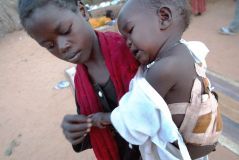Sudan “highly inappropriate” to lead AU – HRW
 Jan 20, 2006 (NEW YORK) — African leaders meeting at the African Union summit next week must act to improve protection of civilians in Darfur and should not elect the Sudanese president as head of the African Union, Human Rights Watch said in two documents published today.
Jan 20, 2006 (NEW YORK) — African leaders meeting at the African Union summit next week must act to improve protection of civilians in Darfur and should not elect the Sudanese president as head of the African Union, Human Rights Watch said in two documents published today.
Sudan’s Candidacy to Lead the A.U.
Sudanese President Omar El Bashir is a candidate for the presidency of the pan-African organization which is due to rotate to an East African country in 2006. The A.U. head is expected to be elected by the 53 member states at the summit in Khartoum, Sudan, on January 23-24.
“It would be highly inappropriate for the Sudanese government, which is responsible for war crimes and crimes against humanity in Darfur, to preside over the African Union,” said Peter Takirambudde, executive director of the Africa division at Human Rights Watch. “The A.U.’s credibility, and its ability to promote and protect human rights, would be irreparably damaged.”
The Sudanese government, its militias, and members of the rebel movements are already under investigation by the International Criminal Court for crimes in violation of international law in Darfur.
African Mission in Sudan
In a 57-page report published today, “Imperatives for Immediate Change: The African Union in Sudan,” Human Rights Watch examines the evolving role in the Darfur conflict of the African Union Mission in Sudan (AMIS), from its inception as a ceasefire monitoring body in June 2004 to its current incarnation as a major operation with a mandate to protect civilians that includes armed troops, unarmed civilian police, unarmed military observers, and support teams.
The report looks at factors that must be taken into account in any transformation of AMIS to a United Nations mission, and makes recommendations in this regard. As A.U. leaders and U.N. planners consider a transfer of the AMIS force to U.N. control, they will need to ensure that the change does not diminish the mission’s ability to protect civilians. The report also identifies ways AMIS can be immediately strengthened to improve civilian protection in Darfur.
“Any transfer to the U.N. could take months,” said Takirambudde. “In the meantime, AMIS can make immediate changes to improve civilian protection and demonstrate that it has the capacity and will to protect civilians in Darfur now.”
The report is based on an expert technical military assessment of the African Union Mission in Sudan and on Human Rights Watch’s extensive research and reporting on the human rights crisis in Darfur. The report calls for aggressive patrolling throughout Darfur by AMIS troops properly equipped with armored personnel carriers, tactical air support, and other necessary equipment.
“African Union troops must respond aggressively to the persistent violence against civilians in Darfur,” said Takirambudde.
The AMIS rules of engagement must be clarified to allow the use of deadly force to protect civilians, including humanitarian operations under threat; the decision to use deadly force should be delegated from the AMIS force commander to the sector commanders in the field. AMIS should deploy fully equipped quick reaction forces to respond immediately in each sector. They should augment and reformulate AMIS civilian police forces to provide them with the power to arrest persons engaged in criminal activity.
The A.U. operation in Darfur has been repeatedly obstructed by the Sudanese government. Only recently, after months of delay, did the Sudanese government allow AMIS to import 105 armored personnel carriers necessary to protect civilians as well as AMIS forces. In October, five AMIS soldiers from Nigeria were killed in a shootout with government-backed militias in South Darfur. On January 6, a Senegalese soldier was killed in the line of duty in West Darfur.
“African leaders must put all possible pressure on the Sudanese government to stop impeding the effective operation of AMIS,” said Takirambudde. “The Sudanese government’s continued attacks on civilians merit a tougher response from the African Union.”
The Human Rights Watch briefing paper “Briefing to the African Union Member States [Sixth Summit of the African Union, January 23-24, 2006]” is available at:
http://hrw.org/english/docs/2006/01/18/africa12457.htm
The Human Rights Watch report Imperatives for Immediate Change: The African Union Mission in Sudan is available at:
http://hrw.org/reports/2006/sudan0106/
